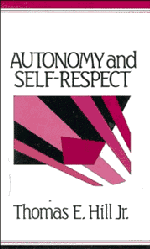Book contents
- Frontmatter
- Contents
- Sources and acknowledgments
- Introduction
- 1 Servility and self-respect
- 2 Self-respect reconsidered
- 3 Autonomy and benevolent lies
- 4 The importance of autonomy
- 5 Symbolic protest and calculated silence
- 6 Moral purity and the lesser evil
- 7 Self-regarding suicide: a modified Kantian view
- 8 Ideals of human excellence and preserving natural environments
- 9 Weakness of will and character
- 10 Promises to oneself
- 11 Social snobbery and human dignity
- 12 Pains and projects: justifying to oneself
- 13 The message of affirmative action
- Index
2 - Self-respect reconsidered
Published online by Cambridge University Press: 05 June 2012
- Frontmatter
- Contents
- Sources and acknowledgments
- Introduction
- 1 Servility and self-respect
- 2 Self-respect reconsidered
- 3 Autonomy and benevolent lies
- 4 The importance of autonomy
- 5 Symbolic protest and calculated silence
- 6 Moral purity and the lesser evil
- 7 Self-regarding suicide: a modified Kantian view
- 8 Ideals of human excellence and preserving natural environments
- 9 Weakness of will and character
- 10 Promises to oneself
- 11 Social snobbery and human dignity
- 12 Pains and projects: justifying to oneself
- 13 The message of affirmative action
- Index
Summary
When thinking about the servility of an Uncle Tom, an overly deferential wife, and an extremely self-deprecating person, I once suggested that one way persons can lack self-respect is to fail to appreciate their equal basic rights as human beings. The failure, I thought, could stem either from unawareness of one's status as an equal or from valuing that status less than one should. The servile person, it seemed, let others violate his rights at will or too readily declined to exercise his rights.
One appealing feature of this idea was that it corresponded with the intuitive feeling that everyone ought to be respected in some ways, regardless of talent, social position, accomplishment, etc. Basic respect as a human being, one feels, does not need to be earned; and if respect is having proper regard for rights, then at least some respect is due each person without his needing to earn it. A person may lack self-respect not merely by underestimating his merits and achievements but also by misunderstanding and undervaluing his equal rights as a human being.
Although this account may still explain the instances of servility I considered, it does not fit all cases in which a person fails to respect himself. Just as one may respect others for their special merits and achievements, one may respect oneself for exceptional qualities. One who lacks this sort of respect for himself, perhaps because he does not have any special merit, does not necessarily misunderstand or undervalue his rights.
- Type
- Chapter
- Information
- Autonomy and Self-Respect , pp. 19 - 24Publisher: Cambridge University PressPrint publication year: 1991
- 6
- Cited by

